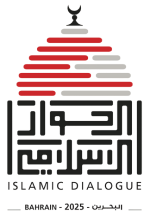Scholars and intellectuals participating in the third session of the Intra-Islamic Dialogue Conference, held under the theme “One Nation… One Shared Destiny.”
Participants discussed the role of women in Islamic dialogue, fostering understanding among different Islamic schools of thought, and countering efforts to exploit differences to create division.
The session, moderated by Dr. Rashid bin Ali Al Harthi, Dean of the College of Sharia Sciences in the Sultanate of Oman, focused on the role of women in promoting dialogue as essential partners in societal development and advocates of tolerance and moderation.
In his remarks, Dr. Mahmoud Alkhuzaee, President of Justice and Wisdom in the United States, underscored the importance of spreading a culture of dialogue and tolerance to strengthen women’s status in society.
He noted that empowering women benefits the entire community, emphasising that their role extends beyond participation in events. He referenced Khadijah bint Khuwaylid, wife of Prophet Muhammad (PBUH), as an example of wisdom and faith, highlighting her contributions to supporting the Islamic call.
Dr. Aisha Yousif Al Mannai, Director of the Muhammad bin Hamad Al Thani Centre for Muslim Contribution to Civilisation at the College of Islamic Studies, Hamad Bin Khalifa University, emphasised that meaningful intra-Islamic dialogue requires the active participation of both men and women, as they are equally essential to society.
She highlighted the role of women in instilling a culture of dialogue from childhood by promoting respect for differences and reinforcing principles of tolerance and moderation.
She cited the Al Azhar Declaration, which highlights that societies cannot progress unless both men and women share responsibilities in building and advancing communities. She stressed that both have an essential role in upholding social, cultural, and religious values while contributing to the collective development of the Islamic world.
Dr. Al Mannai also highlighted the resilience of Palestinian women in times of crisis, stating that their steadfastness in the face of adversity demonstrates their role in preserving identity and reinforcing Islamic values.
Dr. Shaikha Maryam bint Hassan Al Khalifa, Vice President of the Supreme Council for Women (SCW), addressed the role of women in shaping intra-Islamic dialogue.
She emphasised that, as half of society, women have a significant influence on fostering a culture of understanding from an early age.
She emphasised the importance of instilling values of tolerance and openness while enhancing dialogue skills among younger generations.
Dr. Shaikha Maryam bint Hassan emphasised that fostering a cohesive society requires respecting religious and sectarian diversity, even in the presence of differing viewpoints. She underscored the importance of reinforcing shared values that unite Muslims, enabling the Islamic nation to actively contribute to shaping its future.
Dr. Safinaz Suleiman, a fellow at the University of Wisconsin-Madison in the United States, addressed the challenges facing Muslim communities in the West and the role of Islamic institutions in supporting them.
She emphasised that Muslims in Europe and the United States remain an integral part of the global Islamic nation and represent a source of civilisational strength that must be nurtured through stronger ties with the broader Muslim world.
She noted that leading Islamic institutions, particularly Al Azhar, can play an important role in supporting Muslim communities in the West through cultural exchange programmes, academic cooperation, and initiatives that equip religious leaders with the necessary tools to promote a correct understanding of Islam.
Dr. Nahla Al Saeedi, Advisor to the Grand Imam of Al Azhar for Expatriate Affairs, highlighted women’s contributions to fostering dialogue, noting that Islam grants them a distinguished status and recognises them as partners in building societies. She cited historical examples, such as Aisha bint Abi Bakr, wife of Prophet Muhammad (PBUH), who played a crucial role in enriching religious discourse.
Dr. Al Saeedi also called for enabling women to take on a more active role in bridging differences between Islamic sects, leveraging their natural abilities in communication and conflict resolution.
Participants unanimously agreed that dialogue is essential for achieving social harmony and strengthening coexistence among Islamic schools of thought.
They noted the importance of embedding these values within society. They emphasised the need to integrate women into these efforts as key contributors to shaping future generations based on the principles of tolerance and mutual understanding.


